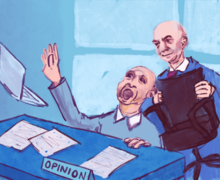Crockett: Bill to defund Planned Parenthood disregards low-income communities
President Barack Obama said you can judge a nation based on how it treats its women and girls during a signing of a memorandum in 2014, which established the White House Task Force on Protecting Students from Sexual Assault.
Yet, the House of Representatives approved legislation earlier this month to defund Planned Parenthood for one year.
All people deserve access to quality sexual health care, and Planned Parenthood is an organization that provides basic provisions for men and women who may not be able to afford these necessities through other means. To defund it not only puts people at a disadvantage, but also shows legislative disregard for people of lower income communities.
Planned Parenthood has come under scrutiny after a series of videos were leaked in July insinuating that the organization sells fetal tissue to other parties without the consent of the patient. Although the House of Representatives has approved a bill to cut off the nonprofit’s funding, Obama said he would veto any bill that defunds the group.
The question of ethics and honesty is a pivotal one, considering Planned Parenthood’s practices could be exploiting unsuspecting patients, although the claims have not been proven. But what is most problematic is the idea of removing the organization altogether, as if women and men have not greatly benefited from it since its inception nearly 100 years ago.
According to its website, Planned Parenthood has been able to service over five million people a year worldwide and has approximately 700 centers in the United States alone.
At this time, federal funding does not even pay for abortions, but allows the organization to provide HIV testing, various forms of birth control, counseling, general health care and information that is accessible to low-income women and men. To remove funding from the organization is to put a disproportionate amount of people at risk.
The moral dilemma of abortion is unique to each person, and rightfully so, but we cannot deny those who want or need the operation based on allegations of ethical practices or even personal beliefs.
The congressional effort to defund Planned Parenthood is really an attack on low-income women, forcing them to find centers that may or may not supply them comprehensible, credible sexual health care. At best, the campaign to close the doors of the nonprofit is an attempt to provide more third-party health centers in underprivileged communities; at worst, it’s poverty shaming.
Women, regardless of their income, should have the freedom to do what they like with their bodies. Stripping away Planned Parenthood’s resources and closing down abortion clinics will force many women to abort through unsafe means.
These measures will also take away proper sex health education, causing many people to rely on hearsay and urban myth. There are still some people who believe the pull-out method is totally effective, for goodness sake.
Last month, members of the GOP, led by Sen. Ted Cruz, spoke out against Planned Parenthood and questioned its ethics. Attacking abortion is a common tactic of the Republican Party, and the desire to defund Planned Parenthood lacks consideration of women who need and deserve access to the same quality of healthcare Cruz and the members of congress possess.
When politicians attack an establishment of this nature without having a holistic view of its necessity, they must have a thorough understanding of what communities will be directly affected and the consequences that will come of its absence.
Elaina Crockett is a senior television, radio and film major and African American studies minor. Her column appears weekly. She can be reached at ekcrocke@syr.edu.
Published on September 27, 2015 at 10:10 pm






